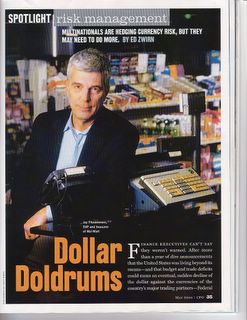
Dollar Doldrums

Dollar Doldrums - CFO Magazine - May Issue 2005: "Consider Wal-Mart, arguably the U.S. company most heavily exposed to a run on the dollar. China is the discount retailer's largest source of products, supplying some $20 billion in goods last year, according to analysts. The company plans to increase U.S. borrowings in 2005, says Jay Fitzsimmons, Wal-Mart's treasurer and senior vice president of finance, though he contends it's not for purposes of hedging, since the Chinese currency is linked to the dollar.
In any case, says Fitzsimmons, "we try to do as much as we can naturally." Natural hedges include setting aside cash and borrowing in local currencies such as sterling, yen, and Canadian dollars. But Fitzsimmons says the company will probably borrow about $5.5 billion to $6 billion by year's end, up from about $1 billion so far this year. Its total debt portfolio currently weighs in at around $30 billion, including everything from public bond issues to commercial paper.
Like other companies, Wal-Mart has natural alternatives to hedging with debt, including diversification, thanks to retail operations in 10 different countries. "On one level, our retail operations portfolio contains a mix of emerging markets and more-established markets," notes Fitzsimmons. Two of Wal-Mart's largest markets—Canada and Mexico—recently saw their currencies actually fall against the U.S. dollar. (The company's 37.8 percent interest in a Japanese retail outlet, Seiyu Ltd., is accounted for as an equity investment, and is not consolidated.)
Also, Wal-Mart tries to get what Fitzsimmons describes as the "lowest possible margin commensurate with the risk" in its purchasing and retailing arrangements. As a result, he says, "the actual impact of currency on the merchandise we buy is minimal." The company buys very little from Europe. As for the risk posed by the Chinese yuan, he contends it is undervalued versus the dollar by about 4 percent, noting that "5 percent is kind of the margin of error."
Because of this, Fitzsimmons dismissed dire predictions that the Chinese government will wreak havoc on his bottom line by abruptly jettisoning its currency's link to the greenback. "We buy everything in dollars," he says. "The Chinese aren't interested in getting more yuan. Their number-one priority is keeping people employed."








No comments:
Post a Comment